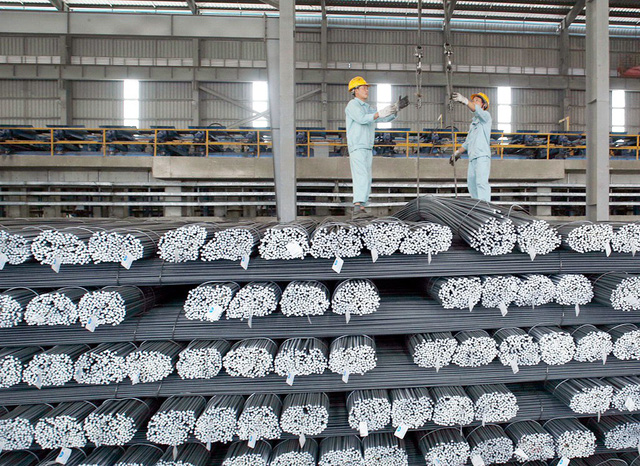As the country’s products are part of China’s value chain, Vietnam surely cannot avoid the cascading effect from the trade war between these two biggest economies in the world
The trade dispute between the U.S. and China, two of Vietnam’s top trading partners, could leave both positive and negative impacts on the country, as well as other Southeast Asian nations, business insiders and experts forewarned.
With many Vietnamese products being part of China’s value chain, it is certainly that Vietnam cannot avoid the cascading effect from the trade war between these two biggest economies in the world, according to experts interviewed by Tuoi Tre (Youth) newspaper.
It is therefore suggested that not only Vietnamese enterprises but also the government be prepared to confront and deal with different situations that may follow the U.S.-China ‘trade war,’ which officially broke out on Friday as the States announced a 25-percent tariff on US$50 billion of Chinese goods.
More than 800 exports, worth about $34 billion, will be subject to tariffs starting on July 6.
Another 280 or so still need to undergo a public comment period, and will take effect later. U.S. President Donald Trump also threatened to raise the value if China retaliates. On the same day, China immediately introduced countermeasures of the same scale and strength by imposing its own 25-percent tariffs on 545 categories of U.S. products worth $34 billion from July 6.
Opportunities
With China facing escalating retaliation from the U.S., Vietnam could serve as an alternative supplier of several commodities, which the Southeast Asian country has advantage in, for its northern neighbor.
According to a representative from Handicraft and Wood Industry Association of Ho Chi Minh City (HAWA), Vietnam’s wooden products and furniture will become more competitive, with wooden products among items to be affected by the tariff war, and made-in-China wooden products are facing anti-dumping lawsuits in the U.S.
China is the biggest exporter of wooden products to the U.S., and Vietnam stands just three places behind. Vietnam’s wood industry could achieve higher growth if local businesses can grab the opportunity that may open up when the U.S. shifts purchase from China to Vietnam, according to experts.
Amid the battle of tariffs between the U.S. and China, any disruption to supply and distribution chains could have a lasting impact. In the worst-case scenario, companies currently operating in China may have to relocate their factories or distribution centers to reduce the impact from the U.S. tariffs on China.
This is a chance for Vietnam, as an export-oriented economy, to strive to attract investors and emerge as an attractive alternative destination for manufacturers who want to restructure their supply chains.
In reality, Vietnam's exports to the U.S. saw an increase of 14.65 percent year-on-year, accounting for 39.7 percent of total exports in the first two months of 2018, while the tit-for-tat exchange of tariffs between the U.S. and China was still an egg of a trade war.
Negative impacts
If the U.S. imposes broader tariffs on China, it will affect the cross-border supply chain. Vietnam, a supplier of inputs for many of Chinese exports, will also be hurt as a cascading effect. This will be true for every economy that is part of the U.S.-China value chain.
On the other hand, China-based firms facing higher tariffs will redirect their raw materials exports towards Vietnam to hide the origin of their Chinese-made products to avoid tariffs. This practice will affect the local industries in Vietnam, evidenced by the case of steel originated in China but were exported from Vietnam.
Last month, the U.S. Department of Commerce decided to levy import tax on steel produced in Vietnam using Chinese-origin materials. Besides, economic experts say that China's high inventories of goods due to trade disputes with the United States may cause the country to apply dumping on neighboring markets.
Nguyen Tat Thang, general secretary of the Animal Husbandry Association of Vietnam (AHAV), on the other hand expressed concerns that the US-China trade tensions will delay the signing of a veterinary agreement between Vietnam and China. As a result, the possibility of exporting livestock products from Vietnam to its most potential market will be decreased.
Going forward
To minimize the risks arising from trade disputes, Vietnam has to focus on increasing their market access.
Vietnam is already a signatory of numerous free trade agreements (FTA), with two more major trade pacts coming in effect in the near future, Comprehensive Progressive Trans-Pacific Partnership (CPTPP) and EU-Vietnam free trade agreement (EVFTA). This will give Vietnam an opportunity to increase their exports to alternative markets.
However, Vietnam suffers from under-developed supply chains, heavy reliance on imports of raw materials, and lack of supporting industries. It has to focus on removing these obstacles to not only survive trade wars, but also fully realize the benefits of those upcoming FTAs.























































